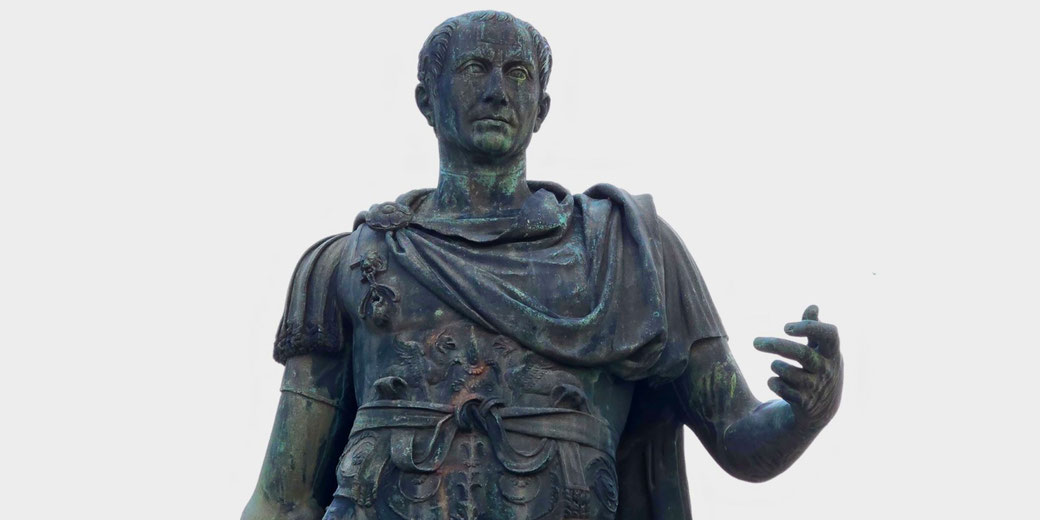Did Julius Caesar want to be king of Rome?

Julius Caesar is one of the most famous names in history. He was a brilliant general, a charismatic leader, and a masterful politician.
He conquered Gaul, crossed the Rubicon, and became the dictator of Rome.
But did he ever want to be a king?
Why people thought Caesar wanted to be king
The answer is not so simple. Caesar's attitude towards kingship was complex and ambiguous. He never openly claimed the title of king, but he also did not shy away from displaying royal symbols and honors.
He accepted a golden chair in the Senate, a laurel wreath on his head, and a statue in the temple of Quirinus, the deified founder of Rome.
He also minted coins with his image and the legend "Caesar Dictator Perpetuo", meaning "Caesar Dictator Forever".
Caesar's actions provoked mixed reactions from the Roman people and the elite. Some saw him as a savior who restored order and prosperity to the troubled republic.
Others saw him as a tyrant who violated the ancestral customs and laws of Rome. The most radical opponents of Caesar formed a conspiracy to assassinate him on the Ides of March, 44 BC.
They believed they were liberating Rome from a would-be king.

Why did Romans hate the idea of kings?
But why did Caesar not simply declare himself king, if he had so much power and popularity?
The answer lies in the deep-rooted hatred of monarchy that the Romans had since their early history.
According to legend, Rome was founded by Romulus, who became its first king. He was followed by six more kings, until the last one, Tarquin the Proud, was overthrown by a popular uprising in 509 BC.
The Romans then established a republic, where power was shared by elected magistrates and a senate of aristocrats.
They vowed never to be ruled by kings again.
The memory of the last king was so detested that his name became a synonym for tyranny and oppression.
The Romans celebrated every year the anniversary of their liberation from Tarquin, and honored Brutus and Collatinus, the leaders of the revolt, as heroes.
They also enacted laws that forbade anyone from aspiring to kingship, and made it a duty for every citizen to kill anyone who tried to become a king.
Was Caesar just 'testing the waters'?
Caesar was well aware of this historical and cultural context. He knew that calling himself king would alienate many of his supporters and inflame his enemies.
He also knew that he did not need the title of king to exercise absolute power. He preferred to use more subtle and acceptable terms, such as dictator, consul, or imperator (commander).
He also tried to justify his actions by claiming that he was acting in the best interest of the republic and its people.
However, Caesar's subtlety was not enough to convince everyone that he did not want to be a king.
Some of his friends and enemies alike suspected that he had a secret ambition to restore the monarchy in Rome.
One of them was Mark Antony, his loyal lieutenant and co-consul. On February 15, 44 BC, during the festival of Lupercalia, Antony offered Caesar a diadem (a symbol of kingship) in front of a large crowd.
Caesar refused it three times, but some people thought that he did so reluctantly or insincerely.
This incident was seen by many as a proof that Caesar wanted to be a king, or at least that he was testing the waters for such a move.
It also increased the resentment and fear of his assassins, who decided to act before it was too late.
A month later, they stabbed Caesar to death in the Senate house, hoping to restore the republic and its freedom.
However, their plan backfired. Caesar's death plunged Rome into a new civil war, which ended with the victory of his adopted son and heir, Octavian (later known as Augustus).
Octavian became the first emperor of Rome, and established a system of government that was essentially a monarchy in disguise.
He avoided the title of king, but he accumulated more power and honors than Caesar ever did.
So, did Caesar really want to be king?
The answer is probably no, at least not in name. But he did want to be the sole ruler of Rome, with unlimited authority and prestige.
He may have hoped to create a new form of government that would combine elements of monarchy and republicanism, but he never had the chance to implement his vision fully.
His legacy was both glorious and tragic: he changed the course of history, but he also paid with his life.
What do you need help with?
Download ready-to-use digital learning resources
Copyright © History Skills 2014-2025.
Contact via email
With the exception of links to external sites, some historical sources and extracts from specific publications, all content on this website is copyrighted by History Skills. This content may not be copied, republished or redistributed without written permission from the website creator. Please use the Contact page to obtain relevant permission.





